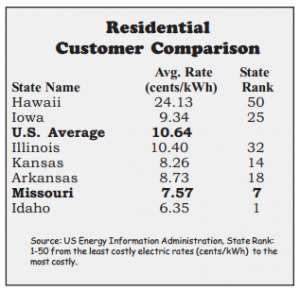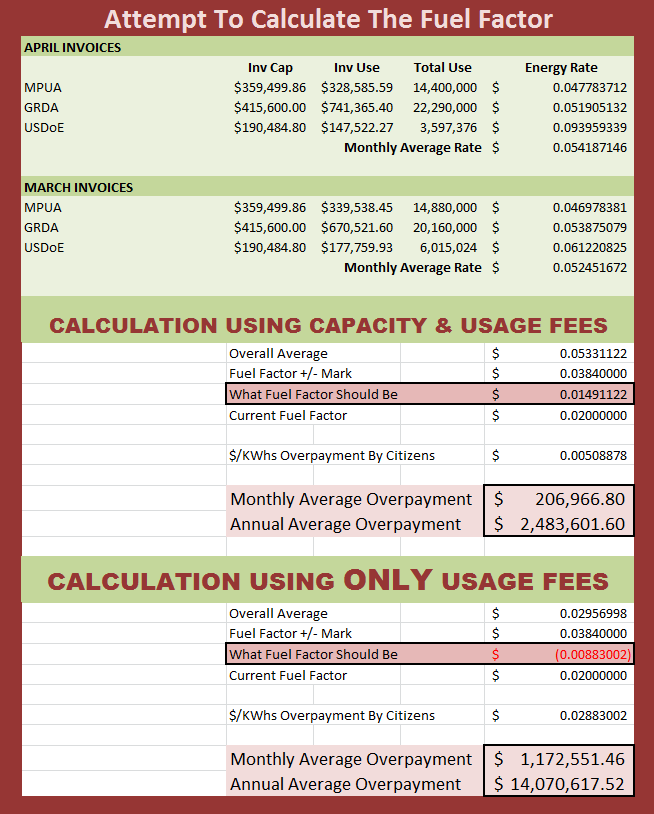Bach Making Citizens Overpay At Least $2.4 Million A Year In Extra Fuel Factor

After reading the “Bach Should Resign! Electric Bill’s “Fuel Factor” Goes Up Without Mandatory Calculation,” a friend asked me to do my best at giving an honest analysis of what the Fuel Factor should be. There are many variables, some of which I do not have control of, for instance, I do not have how much the City used for fuel to power the generators. In actuality, it should be cheaper to generate our own power than purchasing it, so one could speculate that the fuel charges would bring down the Fuel Factor rather than raise it.
I’ve given two different ways of calculating the Fuel Factor: With and Without the Capacity Charges. The way power is purchased is by first agreeing to a long-term contract at a specific maximum capacity which you pay for each month. Then the usage fee is based off how much power you actually use in a given month.
Should Capacity Be A Part Of The Calculation?
From what I can tell, no. The city’s web site states the Fuel Factor is “the purchased power cost plus City generation fuel cost” In other words, the cost of building the generator nor the maintenance is figured into the Fuel Factor. That’s basically what the “Capacity” is, it is the city agreeing to pay for a certain portion of the plant. For that reason, I believe that a true calculation of the Fuel Factor should be somewhere near the second calculation and because it is a negative number. The Fuel Factor should be reducing our electric rates. For that reason, it would make sense that the “Capacity” amount is built into standard $0.0384 base rate.
And in that case, Bach is overcharging the citizens of Poplar Bluff by $14M annually.
But Aren’t Our Rates Better Than Other Areas?
From what I can tell, NO! Our rates are not better than other areas because of how large the Fuel Factor has become. In other areas where their rates are the same or slightly higher, their Fuel Factor is .003 (1/3 of a cent).
In the minutes of a City Council meeting on December 3, 2012, City Manager Bagby stated and Lloyd Matthews discussed Marion, Illinois rates for some reason.
[Matthews stated] Marion, Illinois lowered their utility rates 20 percent and he would like to get to that point sometime.City Manager Bagby stated Marion, Illinois needed to lower rates 20 percent and are still considerably higher than we are.
We need a City Council Fact Checker! I contacted Ameren Illinois today and they provided me with their rate card for Marion, Illinois. The second page describes their purchase power fee and from what I can tell, Marion’s rates are more than 2 cents lower than ours.

This is from the Missouri Public Service Commission page at psc.mo.gov. Poplar Bluff residential rates appaer to be 1/2 cent higher than the Missouri Average.
Residential Customer using 1000 KWh
City of Poplar Bluff average rate $0.081665 / KWh
City of Marion Illinois average rate $0.056440 / KWh
And Sikeston, Mo has no Fuel Factor on their rates:
First 1,000 KWH $0.058 per KWH
Over 1,000 KWH $0.038 per KWH
It is time for a change. Contact your councilman and request that City Council demand the resignation of Utilities Manager Bill Bach.


There are other factors that should be considered when determining fuel factor. During the summer if there is a sudden increase in demand which requires purchasing spot market power during Peak and Off Peak time frames. During Peak demand depending on current energy market demand and fuel costs depending on the type of generation megawatt prices cans swing from $45/MWh to upwards of $400/MWh which would lead to significantly higher Peak demand costs.
“There are many variables, some of which, I do not have control of, for instance, I do not have how much the City used for fuel to power the generators.”
So I’ll just post numbers I think might be right, but cant really be sure, even though these numbers are likely mostly entirely wrong.
“..it should be cheaper to generate our own power than purchasing it.”
Likely yes, but you don’t know that. In any case from what I could gather, the average price per kWh in Missouri was 7-9 cents, depending on where I looked
Here’s some more “calculations”, There are many variables that I do not have control of, for instance, I do not have how much the Becker actually owes me
Attempt to Calculate “Becker’s Debt to Me”
10004940+402505=50439549
According to my calculations you owe me 50439549 yen.